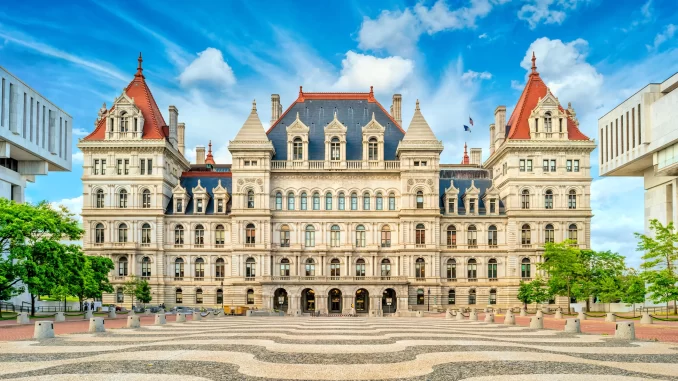
By Hank Russell
Nearly three weeks after the deadline passed, Governor Kathy Hochul and the state Legislature agreed to ratify this year’s $237 billion budget. While the budget provides funding for education, healthcare and infrastructure, among other things, local state legislators were split on the budget.
“This budget agreement represents the most significant improvement in housing policy in three generations,” Hochul said. “It includes transformative investments in health care and education that will put our State on the path to fiscal stability. It will end co-pays for insulin, establish first-in-the-nation paid prenatal leave, and launch the EmpireAI consortium. This budget [also] cracks down on retail theft … And we got it all done without raising income taxes by a single cent.”
One of the noteworthy highlights in the budget was the restoration of Foundation Aid in the amount of $24.9 billion. Assemblyman Ed Ra (R-Franklin Square) said he “applauds” the funding for local schools. Assemblywoman Kimberly Jean-Pierre (D-Lindenhurst) said the Foundation Aid funding was necessary, considering the formula is based on outdated U.S. Census data.
“While this is a great first step, we need to move faster in order to address some of the pressing concerns for the formula,” Jean-Pierre said. “Can we honestly say that we are equitably distributing funds using Census data from 24 years ago?”
Jean-Pierre said she was pleased that some of the money came to Long Island, such as the increase in Aid and Incentives for Municipalities (AIM) funding for local governments, $300,000 for Save the Great South Bay, an organization dedicated to preserving Long Island’s South Shore, and $2 million for the Amityville School District, which is currently facing a $4.6 million deficit.
“It’s a transformative budget in so many ways because it’s a budget where we are investing where it matters for our future generations and for our communities that are going through difficult times,” Jean-Pierre said.
Although Hochul highlighted an anti-crime package that includes crackdowns on retail theft, hate crimes and illegal cannabis shops, Assemblyman Keith Brown (R,C.-Northport) said it was not enough. “The budget includes very little substantive policies to deal with the opioid/fentanyl crisis, bail reform or public safety,” he said.
Assembly Minority Leader Will Barclay (R,C,I-Pulaski) said he was pleased that some of the GOP bills made it into the budget such as more money for school districts, changes in property law to distinguish squatters from tenants, increasing penalties and resources in the fight against retail crime, expanding the eligibility and funding in the state’s Tuition Assistance Program and expanding child care programs and tax credits.
However, he blasted Hochul and the Democrats for including the Good Cause Eviction, which he called “a blatant assault on basic property rights” and “a dangerous step toward universal rent control. Property owners and small landlords will lose more of their rights and cede decision-making controls to the government as Democrats embrace a key component of the radical, socialist platform.”
GOP lawmakers were quick to point out that the budget missed its deadline again this year. When asked about the delay, Jean-Pierre said that the two issues that held up its passage were health care and housing, which caused a tug-of-war between both sides. “There’s never been a state budget where everyone got what they wanted, but that’s where the compromise tends to reside,” she said. “And, ultimately, this is a fiscally responsible budget that will do a lot of good for New York families.”
Brown disagreed, calling the budget “riddled with overspending” and “simply unsustainable. The budget does nothing to reduce taxes for New York’s middle-class families who are struggling and it does nothing to pay down the severe debt our state is in – second only to California.”
But the biggest thing that concerned Ra was the fact that the budget came in late as a result of the governor’s “laissez-faire approach to getting things done” when it came to this budget. “Without a comprehensive financial plan, legislators are forced to operate in the dark, unable to accurately assess revenue versus spending,” Ra said. “While this year’s tax receipts have exceeded projections, the looming specter of multi-billion-dollar deficits remains a significant concern for future budgets.”
Barclay agreed. “Without a commitment to reduce the cost of living, a comprehensive strategy to improve public safety, or a willingness to rein in spending, New York remains on a path of unsustainability.”

